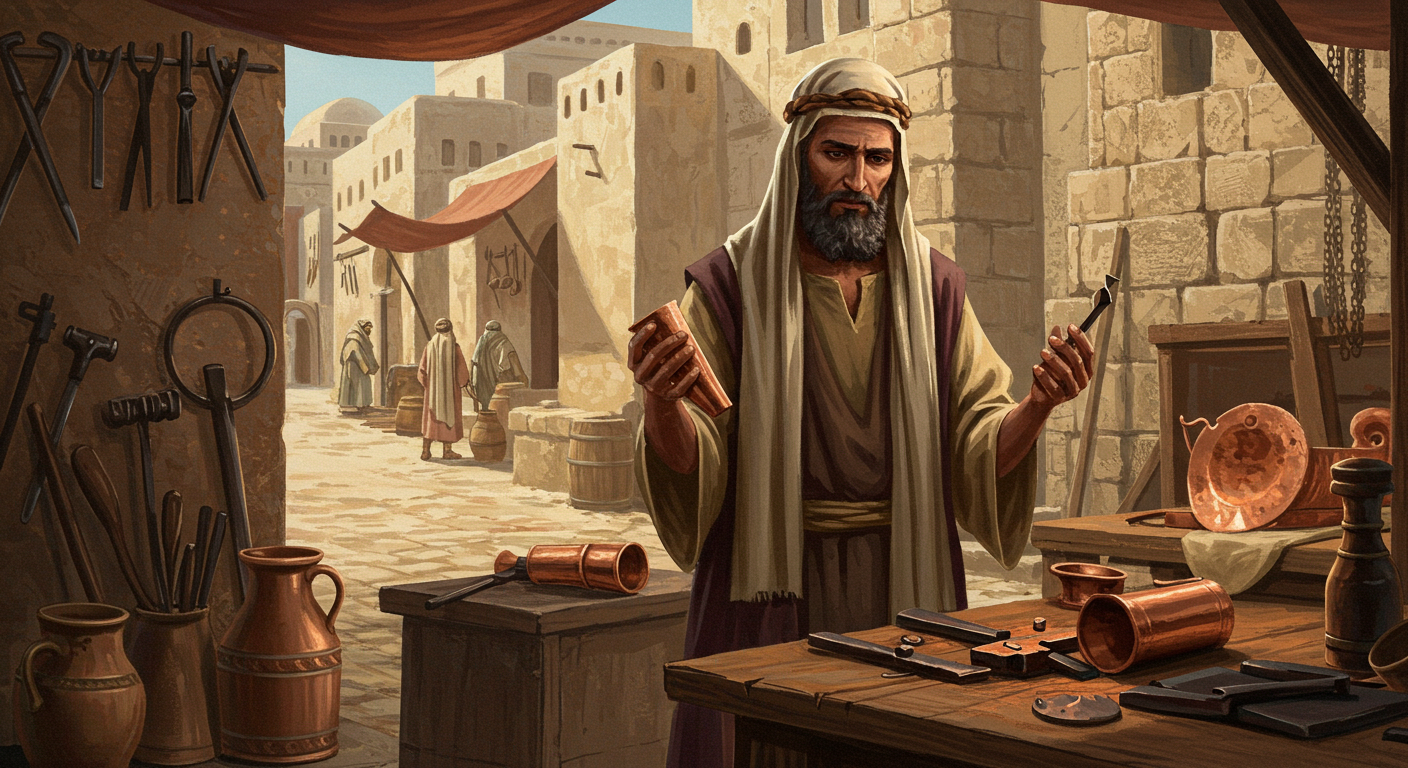Explore Alexander the Coppersmith’s unexpected role in biblical narratives, uncovering his impact on early Christianity’s challenges and the lessons about resilience and faith.

Alexander the Coppersmith: An Enigma in Biblical Narratives
In the vast tapestry of biblical characters, some figures emerge briefly yet leave an enduring impact, much like undefined brushstrokes on a canvas that intrigue and invite speculation. Among them is Alexander the Coppersmith, whose mention in the Bible is scant yet significant. His narrative, though fragmented, highlights the diverse tapestry of individuals who intersect with the spreading of early Christianity. Unlike the more familiar apostles and disciples, Alexander stands as a reminder of resistance and opposition faced by early Christians—an echo of conflicts both spiritual and personal that continue to resonate today.
His Story in the Bible
The story of Alexander the Coppersmith is primarily anchored in a single verse in the New Testament, yet it is loaded with implications. He is mentioned by the Apostle Paul in a note of caution to Timothy. Paul writes, “Alexander the coppersmith did me much harm; the Lord will repay him according to his deeds” (2 Timothy 4:14). Although brief, this mention encapsulates a world of conflict and obstruction. Alexander is portrayed as an adversarial figure, one who directly opposed Paul’s ministry and, by extension, the propagation of early Christianity.
The sparse information about Alexander leaves much to the imagination. Some scholars speculate he might be the same Alexander mentioned in Acts 19:33-34, who was involved in a riot against Paul in Ephesus, although this connection is not definitive (Acts 19:33-34). If they are indeed the same person, it suggests a longstanding animosity towards Paul. However, without explicit biblical evidence linking these identities, Alexander the Coppersmith remains a shadowy figure, a symbol of the antagonists of the early church.
Lessons from His Life
Though we have few details, Alexander the Coppersmith’s life offers poignant lessons about the nature of opposition and steadfastness. Firstly, his story reminds us that conflict is an inherent part of any transformative journey. In pursuing our own paths, especially those driven by faith or conviction, opposition can be expected. Like Paul, our responses to such challenges can either fortify or derail us.
Secondly, this narrative teaches the importance of enduring adversities without harboring bitterness. Paul’s response to Alexander’s harm was to rely on divine justice rather than personal vengeance. This reflects the crucial lesson of leaving judgment to higher powers, an approach that can be profoundly liberating when facing personal or professional conflicts.
Finally, Alexander’s story highlights the ripple effect of one’s actions in a community. Even though he hindered Paul, Alexander inadvertently contributed to the fortitude and resilience of early Christians. His opposition likely reinforced their commitment and unity. In a broader sense, it teaches us that antagonists are sometimes the unintentional catalysts that strengthen resolve and deepen faith.
Connection to Today’s World
In today’s world, where cultural shifts and ideological battles are prevalent, Alexander the Coppersmith’s story resonates as a reminder that resistance is a natural part of innovation and change. Whether in the workplace, community, or on a personal level, individuals often face Alexanders—those who, either consciously or unconsciously, impede progress or innovation. Embracing the conflict with wisdom rather than resentment can transform challenges into opportunities for growth.
For churches and religious communities, Alexander’s story is particularly relevant. It underscores the importance of addressing internal and external conflicts with grace and a commitment to the greater mission. It encourages a forward-thinking approach that values perseverance and trust in divine justice amidst trials.

Key Bible Verse
The critical verse encompassing Alexander’s impact is: “Alexander the coppersmith did me much harm; the Lord will repay him according to his deeds” (2 Timothy 4:14). This verse symbolizes the endurance of faith in the face of adversity. It represents Paul’s unshakable trust in divine justice and his refusal to be consumed by retaliation. In our current contexts, it acts as a powerful reminder to focus on our mission, entrusting justice and recompense to a higher authority.
Thought-Provoking Question
Reflecting on your own life, when you encounter opposition, do you choose to let it define your journey, or do you allow it to strengthen your resolve and deepen your faith, as Paul exemplified in his dealings with Alexander?
Historical and Cultural Context
The backdrop of Alexander the Coppersmith’s narrative is the rich and complex tapestry of the early church, a time of nascent Christianity struggling against both cultural and political adversaries. The Roman Empire, characterized by a pantheon of deities and imperial cult worship, was not conducive to the monotheistic and revolutionary message of Christianity. This period was marked by tension, as the early Christians’ message of salvation and equality clashed with deeply entrenched social hierarchies and religious norms.
Artisans like Alexander were integral to the economic fabric of towns like Ephesus, where commerce, industry, and religion were intertwined. As a coppersmith, Alexander would have been keenly aware of the economic implications of Christianity gaining prominence. The shift in worship from pagan gods, often represented by idols crafted from materials like copper, to an invisible deity, would have threatened the livelihoods of many artisans. Understanding this socio-economic element provides depth to Alexander’s antagonism and highlights the complex interplay between economic interests and religious movements.
Comparison with Other Characters
While Alexander’s role seems minor, it parallels other biblical figures who opposed God’s plan, such as Jezebel from the Old Testament. Like Alexander, Jezebel resisted the divinely ordained progress, embodying the concerted effort to maintain traditional power structures against the tide of prophetic change. Whereas Jezebel’s machinations were more conspicuous, both figures serve as reminders that opposition to divine initiatives manifests in diverse forms. These parallels invite reflection on how God’s work often faces opposition from unexpected quarters and how divine providence operates amid such conflicts.
Prayer Inspired by Alexander’s Story
Let us pray: “Dear Lord, grant us the strength and patience to face opposition with grace and resilience. As Paul did with Alexander, let us entrust justice to You, choosing to focus on our purpose with unwavering faith. May we be instruments of peace and perseverance, even amidst adversity. Amen.” Reflecting on this prayer, consider revisiting 2 Timothy 4:14 for further meditation.







